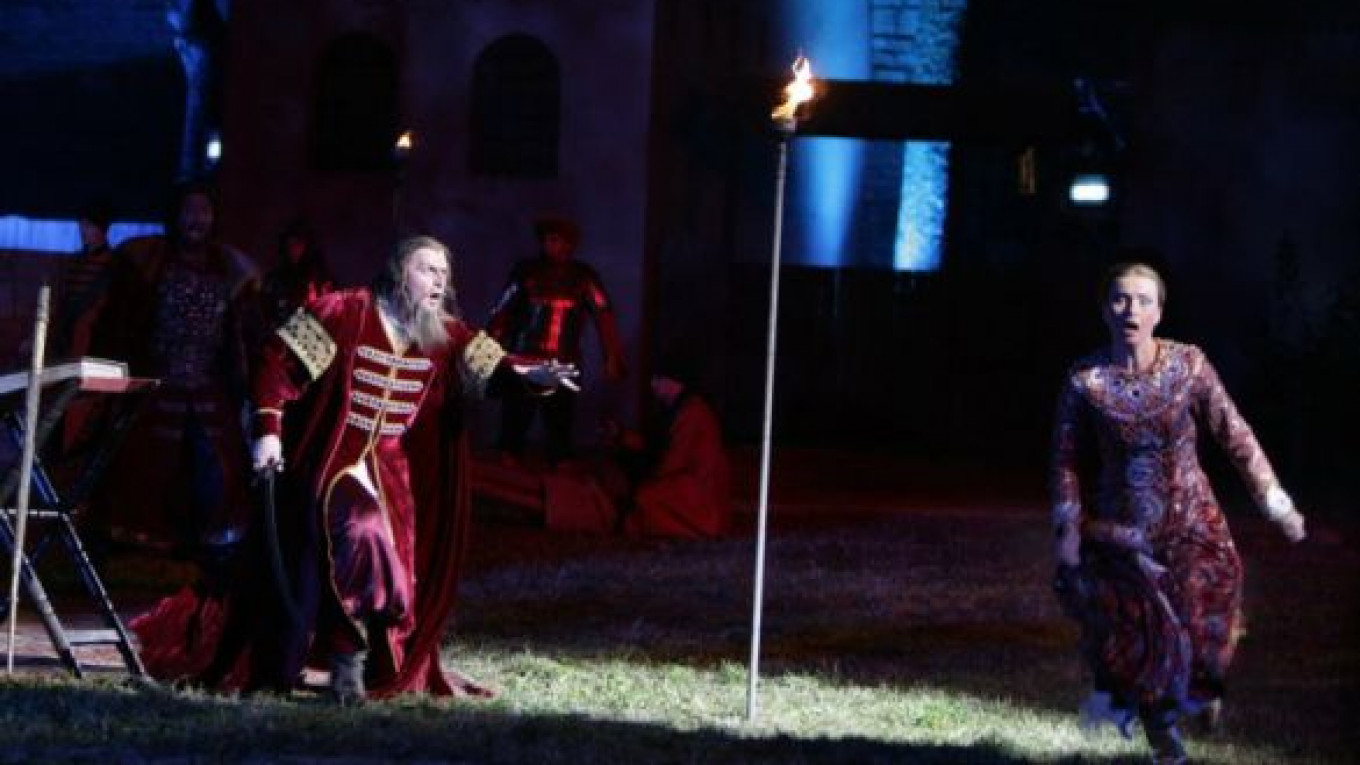The week before last, the ancient city of Pskov, located on the far western edge of Russia near the borders of Estonia and Latvia, marked the 500th anniversary of its accession to the Grand Principality of Moscow. As part of the celebration, the city’s huge and splendidly preserved kremlin played host to a performance of Nikolai Rimsky-Korsakov’s opera “The Maid of Pskov,” a highly romanticized account of an expedition undertaken by Tsar Ivan the Terrible in 1570 to place his stamp of authority on the city.
Musically, the performance proved to be of a very high standard, thanks to excellent work on the part of the chorus, orchestra and, with one exception, soloists of the Bolshoi Theater. But the staging by Yury Laptev, a former Mariinsky Theater baritone who now serves as advisor to President Dmitry Medvedev on matters of cultural development, verged on primitive. And a much too gently sloped seating area caused a large part of the action to take place out of sight of all but a handful of the 4,000 spectators.
Nevertheless, the spectators, who filled every seat at the performance and at a dress rehearsal the previous evening, seemed to find “The Maid of Pskov” an engrossing spectacle. No doubt the pageantry, complete with armored soldiers on horseback and a contingent of the Tsar’s personal guards, plus a horde of extras, had much to do with keeping nearly all of both audiences in their seats to the very end. Adding to the allure was the historic significance of seeing the opera performed for the first time ever on the very spot where much of its story takes place.
Based on a play by mid-19th-century writer Lev Mei, “The Maid of Pskov” was the first of Rimsky-Korsakov’s 15 operas and had its premiere in St. Petersburg in 1873. The role of Ivan the Terrible was a great favorite of legendary bass Fyodor Chaliapin, who performed it, most notably perhaps, in a production staged in 1909 as part of impresario Sergei Diaghilev’s very first Saison Russe in Paris. It was last heard at the Bolshoi in 1999, in a brief run of performances that marked the final appearance at the theater of the greatly revered maestro Yevgeny Svetlanov.
Rimsky-Korsakov’s score contains a couple of fine tunes that, as is typical of the composer, are played over and over again. Otherwise, it mostly relies on declamation, similar, but not nearly as powerful or imaginative, to that heard in Modest Mussorgsky’s almost simultaneously composed opera “Boris Godunov.” Later in his career, Rimsky-Korsakov produced yet another opera, “The Tsar’s Bride,” also adapted from a play by Mei and set in the reign of Ivan the Terrible, and came up with a much more compelling score.
Bass Alexei Tarnovitsky, borrowed for the occasion from St. Petersburg’s Mariinsky Theater, sang a powerful Tsar Ivan, though his acting, like that of many others in the cast, harked back to the era of silent movies or, perhaps more accurately, to what was seen on the Russian operatic stage five or six decades ago. Vyacheslav Pochapsky, a veteran of the Bolshoi’s 1999 performances, brought a still-resonant bass and great dignity to the role of Prince Yury Tolmakov, the Tsar’s appointed head of Pskov’s government.
While much of the opera’s story involves politics and the suppression of a popular uprising, its real focus rests on the Maid of the title, Prince Tolmakov’s supposed daughter, Olga, and her struggle to marry the man she loves rather than an odious boyar’s son chosen by the Prince. Eventually recognized by the Tsar as his own daughter, she ends up losing her life in a skirmish between the Tsar’s soldiers and a group of local dissidents.
Fortunately for the Pskov production, the Bolshoi came up with a near-perfect Olga in the person of soprano Yekaterina Shcherbachenko, who last year won the prestigious Singer of the World contest in Cardiff, Wales, and, as a result, is soon due to make her debut at some of Europe’s leading opera houses as well as New York’s Metropolitan Opera. Looking the picture-perfect Russian princess and singing with extraordinary purity of tone and diction, Shcherbachenko raised the level of the performance to heights of grandeur at her every appearance.
Pskov itself should be on the list of places to visit for anyone with interest in the history of Russia and its art and architecture in the first half or so of the last millennium. Just an easy overnight train ride from Moscow, the city boasts, in addition to its dramatic Kremlin, an array of churches and palaces, some dating back to the 12th century, that are rivaled only by the better-known Novgorod, some 150 kilometers to the northeast. And not far from the city are fortresses and monasteries of similar antiquity, set in countryside as beautiful as any to be found in the European regions of Russia.
A Message from The Moscow Times:
Dear readers,
We are facing unprecedented challenges. Russia's Prosecutor General's Office has designated The Moscow Times as an "undesirable" organization, criminalizing our work and putting our staff at risk of prosecution. This follows our earlier unjust labeling as a "foreign agent."
These actions are direct attempts to silence independent journalism in Russia. The authorities claim our work "discredits the decisions of the Russian leadership." We see things differently: we strive to provide accurate, unbiased reporting on Russia.
We, the journalists of The Moscow Times, refuse to be silenced. But to continue our work, we need your help.
Your support, no matter how small, makes a world of difference. If you can, please support us monthly starting from just $2. It's quick to set up, and every contribution makes a significant impact.
By supporting The Moscow Times, you're defending open, independent journalism in the face of repression. Thank you for standing with us.
Remind me later.






